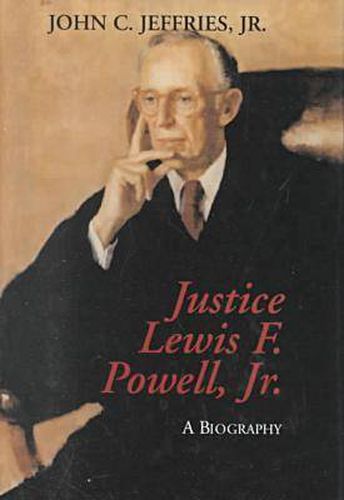Readings Newsletter
Become a Readings Member to make your shopping experience even easier.
Sign in or sign up for free!
You’re not far away from qualifying for FREE standard shipping within Australia
You’ve qualified for FREE standard shipping within Australia
The cart is loading…






Justice Lewis F. Powell, Jr. is an absorbing and readable biography of one of the most important Supreme Court Justices since World War II. From abortion to affirmative action to the constitutionality of capital punishment, Powell’s pivotal votes helped determine the great issues of our time. Nominated to the Supreme Court in 1971, along with future Chief Justice William H. Rebnquist, Powell was expected to join a staunchly conservative bloc of Nixon appointees who would roli back the innovations of the Warren Court. Instead, Powell quickly established himself as an independent voice, the decisive swing vote at the center of an ideologically divided Court. With access to Powell’s private papers, author John Jeffries provides an engrossing insider’s account of the most controversial decisions of Powell’s carcer. These include Roe v. Wade, which first extended constitutional protection to abortion; the Bakke decision, which allowed, but set limits on, race-based affirmative action; decisions wrestling with the constitutionality of the death penalty; the Watergate tapes case, which led to the resignation of a President; decisions on school desegregation and busing; and Bowers v. Hardwick, the 1986 Georgia sodomy case that Powell later felt he decided incorrectly. Jeffries also covers Powell’s pre-Court life, including his World War II experience with top-secret Ultra intelligence, his role in building one of the South’s greatest law firms, and his leadership in providing legal services to the poor. Most important was Powell’s chairmanship of the Richmond School Board during the turbulent years of massive resistance to desegregation. Criticism of his performance in that capacity is carefully examined, and Powell’s behind-the-scenes mancuvering to keep the schools open is fully revealed for the first time. Justice Lewis F. Powell, Jr. is not only fascinating reading but a major contribution to American history.
$9.00 standard shipping within Australia
FREE standard shipping within Australia for orders over $100.00
Express & International shipping calculated at checkout
Justice Lewis F. Powell, Jr. is an absorbing and readable biography of one of the most important Supreme Court Justices since World War II. From abortion to affirmative action to the constitutionality of capital punishment, Powell’s pivotal votes helped determine the great issues of our time. Nominated to the Supreme Court in 1971, along with future Chief Justice William H. Rebnquist, Powell was expected to join a staunchly conservative bloc of Nixon appointees who would roli back the innovations of the Warren Court. Instead, Powell quickly established himself as an independent voice, the decisive swing vote at the center of an ideologically divided Court. With access to Powell’s private papers, author John Jeffries provides an engrossing insider’s account of the most controversial decisions of Powell’s carcer. These include Roe v. Wade, which first extended constitutional protection to abortion; the Bakke decision, which allowed, but set limits on, race-based affirmative action; decisions wrestling with the constitutionality of the death penalty; the Watergate tapes case, which led to the resignation of a President; decisions on school desegregation and busing; and Bowers v. Hardwick, the 1986 Georgia sodomy case that Powell later felt he decided incorrectly. Jeffries also covers Powell’s pre-Court life, including his World War II experience with top-secret Ultra intelligence, his role in building one of the South’s greatest law firms, and his leadership in providing legal services to the poor. Most important was Powell’s chairmanship of the Richmond School Board during the turbulent years of massive resistance to desegregation. Criticism of his performance in that capacity is carefully examined, and Powell’s behind-the-scenes mancuvering to keep the schools open is fully revealed for the first time. Justice Lewis F. Powell, Jr. is not only fascinating reading but a major contribution to American history.